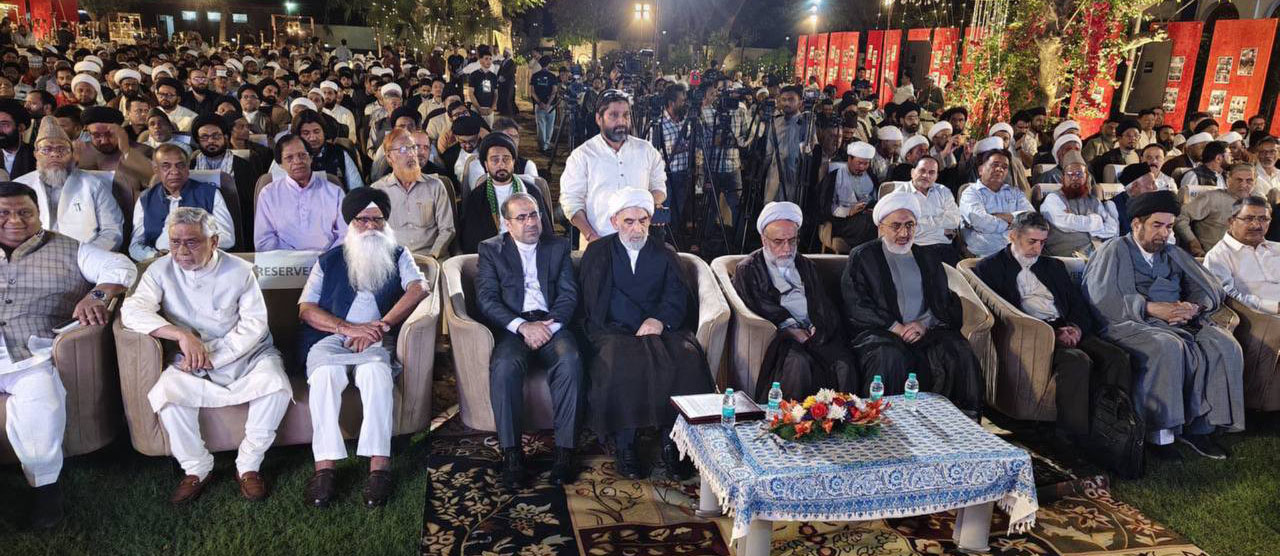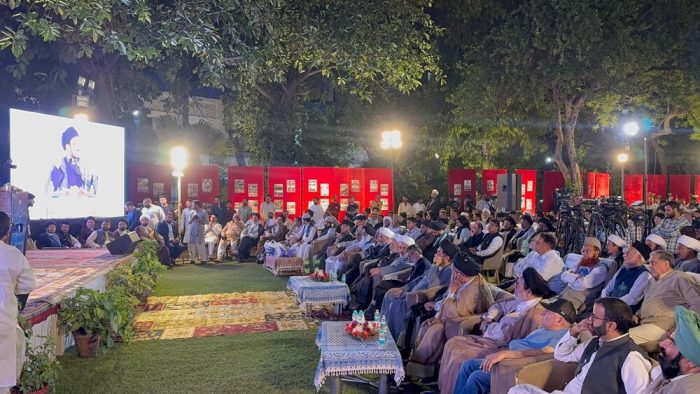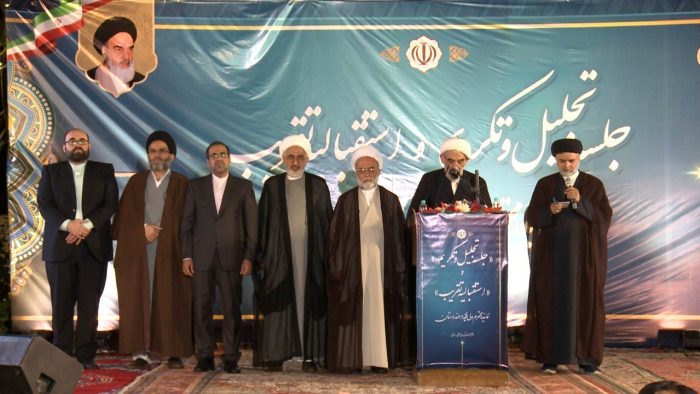New Delhi:WTNS: At the Iran Culture House in the heart of India’s capital, a carefully choreographed ceremony last week signaled both an end and a beginning in Tehran’s religious diplomacy in South Asia.
By Agha Syed Amin Musvi | April 5, 2025
At the Iran Culture House in the heart of India’s capital, a carefully choreographed ceremony last week signaled both an end and a beginning in Tehran’s religious diplomacy in South Asia.
Ayatollah Haaj Shaykh Mahdi Mahdavipour, who has served for fifteen years as the official representative of Iran’s Supreme Leader, Ayatollah Syed Ali Khamenei, was formally relieved of his duties. In his place, Hojat al-Islam Abdul Majid Hakim Elahi, a respected cleric with academic and political credentials, was introduced to the Indian public.
According to Wilayat Times, the event drew hundreds of attendees, including religious scholars, diplomats, academics, students, and journalists from across the subcontinent. Among the guests was Ayatollah Mohsin Qomi, deputy for international affairs in the Supreme Leader’s office, who read out the official message of transition.
“I express my sincere thanks to the honorable scholar, Hojatul Islam
Wal-Muslimeen Agha Mahdi Mahdavipour, for his effective service and positive legacy,” the Supreme Leader’s message read. “I ask God Almighty to bestow upon him divine success and health, and I appoint the honorable Hojat al-Islam Abdul Majid Hakim Elahi to this important religious and cultural position.”
The moment reflected not only a personal transition but the evolving nature of Iran’s soft diplomacy in the region. While political relations between New Delhi and Tehran have historically oscillated, the religious and cultural engagement has remained relatively consistent, particularly through the work of the Supreme Leader’s representative in India.
A Bridge Between Communities
Ayatollah Mahdi Mahdavipour’s tenure was marked by efforts to expand interfaith dialogue and foster community-level connections. From Kashmir to Tamil Nadu, he engaged with scholars and seminaries, facilitated humanitarian outreach, and supported educational programs. He cultivated relationships not just within the Shi’a community but also across sects and faiths.
“India was never just a station for me,” Mahdavipour said in his farewell speech. “It was a mission. I always believed that the values of unity, compassion, and religious tolerance are deeply rooted here. And I tried to echo those values in my work.”
He also acknowledged the cooperation of the Indian government in allowing him to fulfill his religious and diplomatic responsibilities.
“I was never prevented from carrying out my duties,” he said. “Rather, I found respect and understanding from people of all walks of life.”
From Qom to New Delhi
Mahdavipour, a native of Mashhad hails from a prominent clerical family. Known for his scholarly depth and mild temperament, he became a familiar figure at India’s religious institutions and cultural centers. He visited local leaders, participated in community gatherings, and acted as a spiritual advisor to many.
During his tenure, he led numerous initiatives, including Shi’a–Catholic dialogues, support for flood victims in Iran through Indian donors, and the strengthening of Persian language education in South Asia. His efforts were seen as an extension of Iran’s broader goal of promoting religious and cultural ties, beyond state-to-state diplomacy.
A Successor Steps In
Hojat al-Islam Abdul Majid Hakim Elahi, who now assumes the role, brings his own set of credentials. A scholar fluent in Arabic, Persian, English etc, he has previously served in various academic and diplomatic capacities within Iran and he was the representative of the Supreme Leader in Indonesia. In his first public remarks, he signaled continuity.
“India is a country of spiritual richness,” he said. “My goal will be to strengthen cooperation in religious, educational, and cultural spheres. I will continue the legacy of mutual respect that my predecessor so thoughtfully built.”
The Ambassador of the Islamic Republic of Iran to India, Dr. Iraj Elahi, commended Ayatollah Mehdivipour long-standing service, calling him “a bridge between the Iranian people and the diverse communities of India.”
“His diplomatic legacy is built not only on political interaction but on cultural and emotional connections,” the ambassador said.
A Legacy of Quiet Diplomacy
Unlike the high-profile roles of ambassadors or consular officials, the representative of the Supreme Leader in India holds a more nuanced position — rooted in religious tradition, but also tethered to political symbolism.
Mehdivipour departure closes a chapter of sustained engagement and soft-spoken influence. His successor steps into a region both deeply spiritual and geopolitically complex. For Tehran, this is a continuation of a carefully calibrated outreach strategy — one that relies not only on diplomacy, but on doctrine.
The event was also addressed by Shahi Imam of Masjid Fatehpuri Delhi Mufti Mohamamad Mukarram Ahmed, Haaj Mustafa Ghulam of Kuwait, Maulana Syed Kalbe Jawad Naqvi, Maulana Syed Kalbe Rushaid, Maulana Mohsin Taqvi, Member of Parliament from Ladakh Kargil Muhammad Hanifa and Member of Parliament from Srinagar Kashmir Agha Syed Ruhollah Mehdi, Maulana Hussain Mehdi Hussaini, Maulana Abulqasim Rizvi (Australia), Professor Akhtar Al-Wasae, Maulana Ghulam Rasul Noori and other renowned scholars and intellectuals.
Reporting contributed from New Delhi and Qom.
For international syndication or reprint permissions, contact: Wilayat Times





